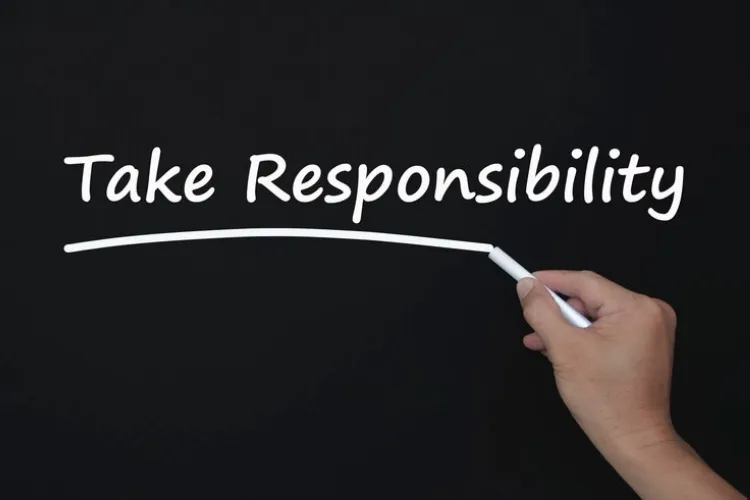
Take Responsibility for Everything
Imagine a life where every decision and outcome is within your control, and every challenge is an opportunity for growth. For Christian men who feel that it's too late to regain their health, taking responsibility for everything isn’t just a mindset — it’s a transformative approach. By embracing this philosophy, you can shift from feeling stuck to developing a sense of purpose and empowerment, shedding the shame of past failures and reclaiming the strength God designed for you.
Taking full responsibility means owning your choices, actions, and their consequences. It’s about stepping away from the blame game and instead focusing on how you can shape your future. This approach doesn’t just help you overcome obstacles; it turns you into the architect of your success.
This blog will explore how this philosophy can help you take charge of your health, fitness, and overall well-being, allowing you to reconnect with your God-given potential.
The Impact of Responsibility on Your Life
Understanding the impact of responsibility on your life can dramatically alter your journey, especially if you're a Christian man struggling with weight, fitness, or health concerns. Responsibility isn't just about doing chores or meeting deadlines; it's about taking charge of your body, making your own health choices, and facing the consequences of those choices.
It’s about stepping up and owning your situation instead of blaming yourself for past setbacks or failed attempts at weight loss. You might think, "I’ve tried everything, and it’s not my fault I can’t lose the weight." And you're right — sometimes life throws curveballs, and health challenges can be overwhelming. But responsibility isn't about fault; it's about action.
It’s about saying, "Okay, this is my situation. What can I do about it now?" Taking responsibility means not waiting for someone else to fix your problems. It means looking for solutions, even if they seem difficult. It means setting goals and making plans to honor your body as God intended. Whether that’s through my 4E System of Weight Loss or another path, it’s about getting up each day and doing something — anything — to move forward. This is the first step towards taking control of your health and life.
The Link Between Responsibility and Personal Empowerment
Now, let’s consider how taking responsibility can fuel your empowerment. When you take full ownership of your actions and their outcomes, you’re no longer a victim of circumstance. You’re in the driver’s seat, empowered and equipped to steer your health and fitness in any direction you want, even after 50.
Consider a situation where you’ve struggled with weight loss in the past. You could blame age, genetics, or just bad luck. However, if you shift your viewpoint and take responsibility, things change. You’d start to recognize that it’s you who controls your health journey. You’d start brushing up on your knowledge, focusing on fitness, and actively making healthier choices.
And it’s not just about weight loss. Owning up to your past lifestyle choices makes you more disciplined in your faith. Taking responsibility for your body — God’s temple — nudges you toward better habits like consistent exercise, prayer, and healthy eating.
In every aspect of your life, taking responsibility means taking power back into your hands. In essence, responsibility is the key to personal empowerment. It’s not always easy, but it’s always rewarding.
Common Challenges in Taking Responsibility
Facing up to responsibility can be tough, especially when you're dealing with the frustration of failed weight loss attempts or chronic health issues. The weight of your situation can feel overwhelming, and it's tempting to lay blame elsewhere. You may feel stuck, seeing no way out of the rut, and it’s easier to shift responsibility to others than to confront the reality of your health decline.
Another challenge you might encounter is the fear of failure. You’ve probably been led to believe that mistakes in your health journey reflect negatively on you. This fear can paralyze you, preventing you from taking the necessary steps toward personal growth.
Additionally, societal and familial pressures may hold you back. As a Christian man, you might feel that you’ve been given specific roles and responsibilities that make it difficult to prioritize your health. You might feel guilty for taking time for yourself to exercise or prepare healthy meals.
Lastly, a lack of self-belief is a common hurdle. You may doubt your ability to regain your health, especially if you've struggled with weight gain for years. This can severely hamper your ability to accept responsibility for the changes needed.
Mastering Responsibility: Key Steps to Empower Yourself
Taking responsibility is the first step toward regaining control of your life — including your health, relationships, and faith. Here’s how you can start empowering yourself today.
1. Own Your Decisions
You might be at a point where you feel overwhelmed by past choices, especially when it comes to your health. But remember, every decision you make is a new chance to change things for the better. Whether you decide to start a morning walk, cut back on unhealthy foods, or simply say "no" to a habit that’s been holding you back, the key is to own it.
Reflect on one decision you've made recently. It could be about your health or any other part of your life. Now ask yourself, “What can I do today to make sure I follow through with this decision?” Write it down, make it clear, and commit to it.
If you’ve decided to improve your eating habits, start small by swapping out one unhealthy snack each day. Maybe it’s switching chips for an apple or soda for water. That one choice adds up over time and reinforces your commitment.
2. Face Mistakes With Confidence
Everyone makes mistakes, but what matters is how you respond to them. Instead of getting stuck in guilt, see mistakes as part of the process. It’s okay to stumble but don’t let it derail your progress. Own your mistake, but also own your ability to fix it.
The next time you slip up, whether it's skipping a workout or eating something you regret, don’t beat yourself up. Instead, ask yourself, “What can I learn from this?” Make a plan to do better tomorrow. The key is not to let one mistake turn into a pattern.
Say you missed your daily walk today. Don’t give up for the rest of the week. Get back on track tomorrow by scheduling a time and sticking to it. Small adjustments build long-term success.
3. Stop Blaming and Start Acting
It's easy to fall into the trap of blaming outside factors like age, a busy schedule, or even genetics for your health struggles. But the moment you stop blaming and start acting, you take back control. This doesn’t mean everything will be easy — but it does mean you’ll make progress.
Identify one area in your life where you’ve been blaming external factors for your lack of progress. Ask yourself, "What small action can I take today to change this?" Then, act on it immediately.
If you’ve been blaming a hectic work schedule for not exercising, find a way to fit in just 10–15 minutes of physical activity a day. It could be a walk during lunch or a quick stretch before bed. You’ll be amazed at how these small actions can shift your mindset.
4. Develop Solutions, Not Excuses
When you’re stuck in a rut, it’s easy to come up with excuses, especially when you’re trying to make changes in your health. But excuses only keep you from moving forward. Instead, focus on finding solutions.
The next time you find yourself saying, “I can’t do this because…” stop and reframe it. Ask, “What can I do instead?” Take a moment to think of alternatives and then implement one of them.
If you say, “I don’t have time to cook healthy meals,” ask yourself, “Can I batch-cook on Sunday to save time during the week?” or “Can I make a simple, healthy smoothie for breakfast?” Thinking in terms of solutions instead of obstacles changes everything.
5. Apply Accountability Everywhere
Being accountable means taking full responsibility, not just for your mistakes but also for your successes. Accountability is the bridge between intention and action. Whether it’s in your health, faith, or relationships, it helps you stay on course.
Share one of your goals with a close friend, family member, or mentor. Ask them to check in on you regularly and keep you accountable. When you know someone’s watching your progress, you’re more likely to stay committed.
If you’ve set a goal to walk 30 minutes a day, ask a friend to text you at the end of each day to see if you’ve done it. Even a simple accountability system like this can push you to stay on track.
6. Cultivate an Empowered Mindset
An empowered mindset is about recognizing that you have control over your choices, emotions, and actions. It’s the belief that even in the face of setbacks, you can push forward and achieve your goals.
Each morning, take five minutes to reflect on your goals. Write down what you want to accomplish that day, whether it’s health-related, spiritual, or personal. This sets the tone for a more focused and empowered day.
Start your day with a short prayer or reflection that aligns with your values and goals. As you do this, visualize yourself living a healthier, more fulfilling life. With this mindset, you’re more likely to follow through on your commitments.
Conclusion
Taking responsibility for every aspect of your life isn’t just an abstract idea — it’s a deeply empowering approach that can transform how you live, especially when it comes to your health, faith, and relationships. By owning your decisions and actions, you shift from being a passive participant to an active creator of your future. It’s about moving away from blame and excuses and embracing solutions and forward movement.
Taking responsibility means recognizing that you have the power to shape your path. It’s not about being perfect or having all the answers; it’s about continuously striving to improve and take action where it matters most. When you take full responsibility, you empower yourself to face challenges head-on, make meaningful changes, and live a life of purpose.
So, what’s your next step? Start today by choosing one area of your life — whether it’s your health, your spiritual journey, or your relationships — and take ownership. Make a concrete plan and take the first step toward creating a life filled with intention and growth.
FAQs
1. How can taking responsibility impact my relationships with others?
Taking responsibility fosters open communication and trust, which can improve your health and relationships. By owning your health choices, you build stronger connections and reduce conflicts, leading to better overall well-being.
2. What are some practical daily habits to help maintain a mindset of responsibility?
Set clear health goals, track your progress, and reflect on your daily habits. Use a health journal and seek feedback from professionals to stay on track and motivated.
3. How do I handle situations where taking responsibility feels overwhelming or beyond my control?
Break issues into smaller steps and focus on what you can control. Seek support from others and practice self-compassion, knowing that small actions lead to progress.
